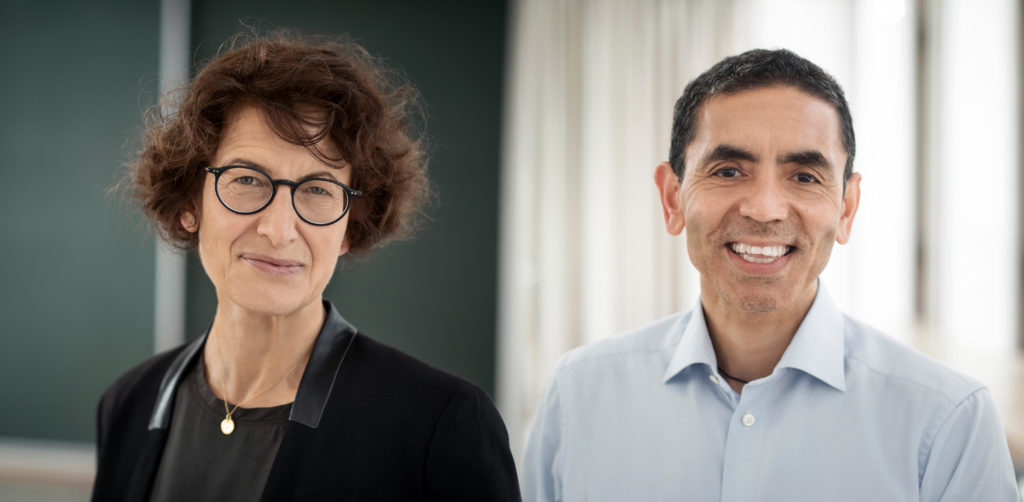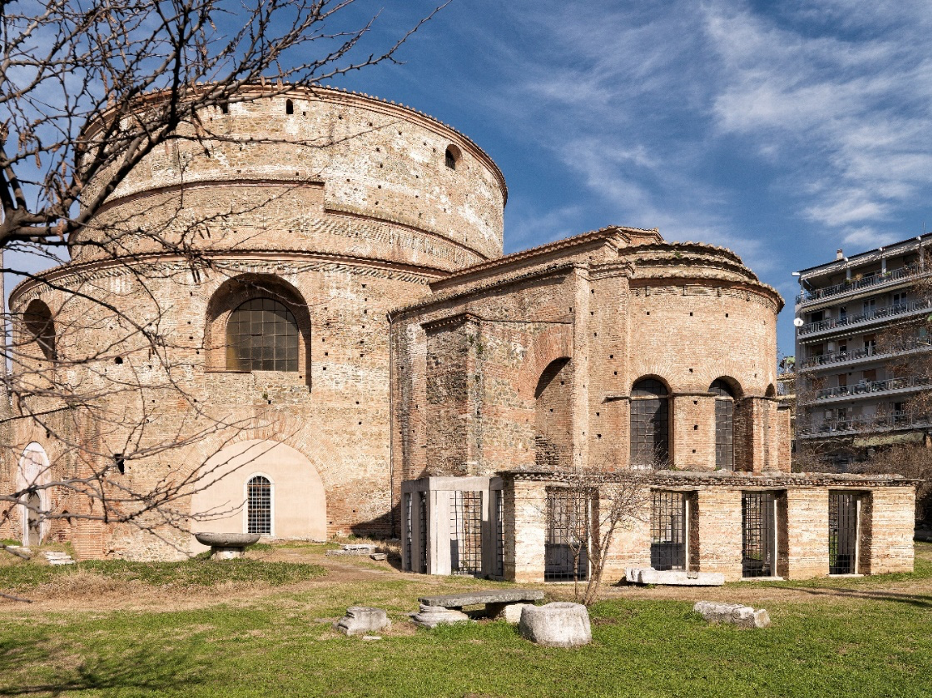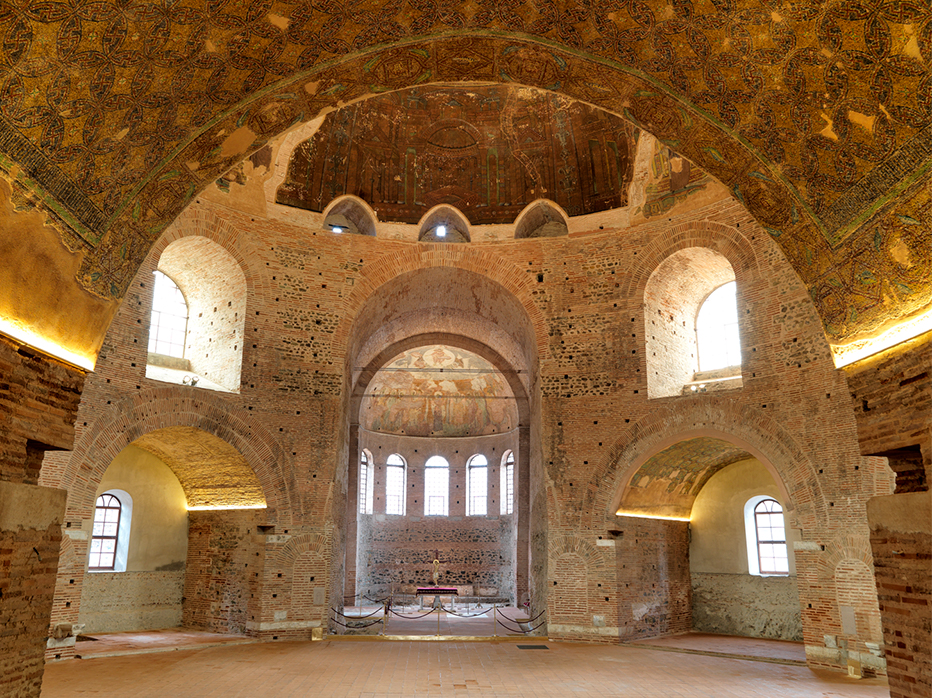The Empress Theophano Prize Honours the Contribution of Science to Humankind
Dr Uğur Şahin and Dr Özlem Türeci, the scientist couple who developed the first vaccine against the coronavirus, are the recipient of this year’s Theophano Prize for saving millions of lives and giving hope to the entire world.
© Studio 8 Photos, Efi Panagoula
You may watch the Ceremony Award HERE
The 2021 Empress Theophano Prize at a glance
The Empress Theophano Prize in 2021 focuses on the critical role science serves in society and on its contribution to the Common Good. The Governing and Advisory Councils of the Theophano Foundation chose to turn our attention to the manifold manners in which science improves people’s lives, by acknowledging the couple who developed the very first vaccine against the novel coronavirus, Dr Uğur Şahin and Dr Özlem Türeci. Setting an example and constituting motivation for young people everywhere, the two scientists have demonstrated solid and persistent efforts to solve an unprecedented health crisis, dedication to the Common Good, and high quality of research and expertise, leading to a discovery that has given hope not only to Europe, but to Humankind.

Just a few months before visiting Thessaloniki for the Empress Theophano Award Ceremony, Dr Uğur Şahin and Dr Özlem Türeci stated that “The Empress Theophano Prize is a great recognition and an honour for us. Thank you for deeming us worthy ambassadors of the cause that this Prize represents: Improving lives is indeed the most noble purpose of science, and a mission which is close to our hearts. We are thrilled to accept this prestigious award and do this on behalf of an extraordinary team that made Project Lightspeed – Made in Europe possible.” Echoing the story of Empress Theophano, a Byzantine princess who became Empress of the German Empire in the 10th century, Dr Uğur Şahin and Dr Özlem Türeci also represent Europe’s diversity, as it becomes a space for tremendous achievement and a field for transnational cooperation.
The Award Ceremony for the Empress Theophano Award 2021 will take place on Wednesday, the 13th of October 2021 in Thessaloniki, in the unique setting of the Rotunda, a landmark monument that epitomises the Roman, Byzantine, Orthodox, Ottoman, and Greek influence on the shaping of Europe.
HE the President of the Hellenic Republic Katerina Sakellaropoulou will honour the Ceremony with her presence and address the distinguished guests.
Alexis Papahelas, journalist and Executive Editor of Kathimerini newspaper, will present the Award Ceremony of the Empress Theophano Prize.
Additionally, the Governing and the Advisory Councils of the Theophano Foundation, chaired by Mr Stavros Andreadis and President Herman Count Van Rompuy respectively, intend to launch – for the first time this year – the Theophano Round Table, a panel discussion on a topic of international importance that will be related to and inspired by each year’s award. This initiative seeks to create a dynamic forum of discussion around critical issues regarding the future of Europe. This year’s event will take place on Thursday the 14th of October, under the title Securing Future Wellbeing Through Science and focusing on themes related to science for the Common Good, science and innovation in Europe, science and competitiveness, science and education, and science and healthy living.
Since its establishment, the Empress Theophano Foundation has set the goal of rewarding individuals and organisations for their impact to the understanding and strengthening of the contemporary European Idea, and their contribution to the social good, to welfare and to the improvement of lives. The start was made in 2020, with the inaugural prize and its focus on Education. The President of the European Commission, Ursula von der Leyen, accepted the first Theophano Prize on behalf of an institution that strengthens mobility, cooperation, and mutual understanding of the younger generations of Europeans: the ERASMUS Student Exchange Programme. Continuing its course into a second year, the Empress Theophano Prize aims to be established, year by year, as a notable means of highlighting the contribution of organisations and individuals in our mutual understanding and cooperation, as well as in facing the challenges of contemporary era within the European framework and beyond.
INFORMATION: Vicky Papadimitriou, Project Coordination | E: info@theophano.eu | T: +30 6937 229858
The award ceremony will take place with the kind support of:

Official air carrier sponsor:

With the kind support of:

The Governing Council
Chairman
Stavros Andreadis
Chairman, SANI/IKOS Group
Chairman, Cultural Society of Entrepreneurs of Northern Greece (GR)
Members
Nikolaos Efthymiadis
Chairman, EFTHYMIADIS Agrotechnology Group
Honorary Chairman, Federation of Greek Industries (GR)
Evangelos Gerovassiliou
Chairman, Gerovassiliou Wines (GR)
Constantinos Gleoudis
Chairman, KAVEX
Member of the Board, Hellenic Society for the Environment and Cultural Heritage (GR)
Theodoros Ikonomou
Chairman, Greek Forest Property Association
Head of a forest management and wood production firm (GR)
Nada Korac Kakabadse
Professor of Policy, Governance and Ethics, Henley Business School, University of Reading (UK)
George Mylonas
Chairman, ALUMIL Group (GR)
Sonja Puntscher-Riekmann
Professor Emeritus of Political Theory and European Politics, University of Salzburg (AT)
Stefan Schepers
Secretary General, High Level Groups on Policy Innovation (BE)
Vassos Konstantinidis
Chairman, INART (GR)
The Advisory Council
Chairman
Herman Van Rompuy
President Emeritus of the European Council
Former Minister of State of Belgium (BE)
Members
Mary McAleese
Former President of Ireland | Professor of Children, Religion and Law, University Glasgow (IRL)
Leonie Bell
Trustee Edinburgh International Festival | Director Victoria & Albert Museum Dundee (UK)
Nikiforos Diamandouros
Former European Ombudsman (GR)
Élisabeth Guigou
President, Anna Lindh Foundation | Former Secretary of State (F)
Tarja Halonen
Former President of Finland (FI)
Agnieszka Holland
Author and film director (PL)
Maria Luisa Poncela
Former Secretary of State (ES)
Michel Praet
Vice-President Museum of European History (BE)
Georges Prevelakis
Professor Emeritus, Paris-Sorbonne University (FR)
Sir Ivan Rogers
Former UK Ambassador to the EU (UK)
Chiara Saraceno
Honorary fellow Collegio Alberto, University of Turin (IT)
Vassilios Skouris
Former President, European Court of Justice of the EU (GR)
Karl Prince zu Schwarzenberg
Former Minister of Foreign Affairs (CZ)
Rita Süssmuth
Former President of the German Parliament (DE)
Panos Tzonos
Professor Emeritus, Aristotle University of Thessaloniki (GR)
Luuk Van Middelaar
Professor of EU Foundations and Institutions, University of Leiden (NL)
EMPRESS THEOPHANO
Empress Theophano, who inspired this prize, is a historic figure of Europe who played a significant role in its development during the 10th century.
The niece of Emperor John I Tzimiskes, she married Otto II and was crowned Holy Roman Empress as his wife. Following his death, she maintained the title of Empress. Her historic presence in Western Europe, dedicated to improving relations between East and West, offered a positive contribution to the cultural renaissance of western European territories, introducing to the west the central role women had in Byzantine society and transferring significant influence from the flourishing Byzantine empire in the fields of education, the arts, commerce, and health, while working to advance civil governance, promoting it over the military.
Empress Theophano is buried at the Cathedral of St Pantaleon in Cologne, Germany.
THE ROTUNDA MONUMENT
The emblematic monument of Thessaloniki, was constructed in the early 4th century AD, on the turning point between the pagan with the Christian world, probably as a temple for ancient cult worship or as a mausoleum for Constantine the Great (306-337). This circular, domed building measures 29.80 meters in height, 24.50 meters in diameter, its walls are 6.30 meters thick and can only be compared architecturally to the Pantheon in Rome. Not long after it was built and during the early years of the long-lived Byzantine Empire (330-1453), the Rotunda was turned into a Christian church with the addition of a sanctuary on its eastern side. The interior was decorated with Early Byzantine (4th- 6th c. AD) wall mosaics of unique artistry and beauty. It was Thessaloniki’s cathedral church (metropolis) between 1524 and 1591, the year in which it was converted to a mosque by the Ottoman conquerors. It remained in use as a mosque until the city’s liberation in 1912. Its dedication since that time to Saint George (Agios Georgios) is owing to the small neighboring church of this name. The mosaic decoration of the Rotunda is a masterpiece of Late Antique art.
Text source: http://galeriuspalace.culture.gr/en/monuments/rotonta/

Photo credits: Ephorate of Antiquities of Thessaloniki City.

Photo credits: Studio 8 Photos, Efi Panagoula.
